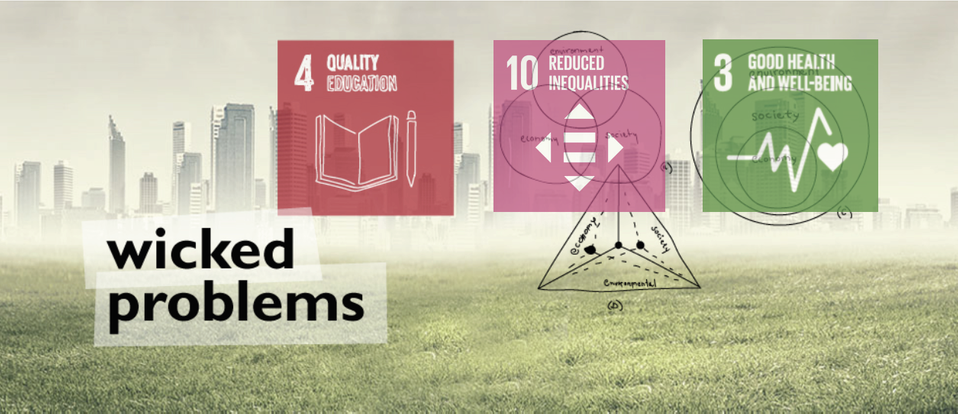About Swedesd - Sustainability Learning and Research Centre

We are a transdisciplinary center that co-creates and implements knowledge and innovations to navigate wicked global health and sustainability challenges
Swedesd is today a national and international research and education center for sustainable development and global health. Since its establishment at the Department of Women's and Children's Health at the Faculty of Medicine in 2021, Swedesd focuses on both sustainable development and global health in its education and research. Together with our partners, we conduct high-quality and co-creative research projects, both in Sweden and abroad. Our research is also translated into the interdisciplinary master program Implementation, Transformative Learning and Sustainability. We are also proud of our Co-Creation Lab, a strategic environment established to strengthen opportunities for researchers and societal partners to jointly navigate so-called wicked issues, i.e. complex problems such as sustainability and global health, which are unique and difficult to conceptualize, predict and solve, and which often require new and transdisciplinary mindsets, perspectives and methods.

Sweded's perspective on global health is to reduce inequalities and achieve the best possible health for all, while reducing humanity's ecological footprint to a sustainable level. This requires a focus on transformative processes and solutions that transcend current practices, integrating multiple perspectives and disciplines. Starting with the health of women and children in a global perspective, we focus on key issues for the 2030 Agenda; how to translate policy and evidence into practice, how to build sustainable health systems and communities, and how to reduce inequalities in health and survival. Developing and evaluating methods to change mindsets and behaviors is a necessity whether it is to improve the care of newborn babies or to meet social, economic or ecological sustainability challenges.
Sustainability challenges are researched in a transdisciplinary way. Researchers from several academic disciplines create knowledge together with stakeholders from all sectors of society. Today's urgent sustainability challenges - climate change, species extinction, injustices and inequalities - are all so-called wicked problems, hitting the most vulnerable the hardest. And ultimately, these challenges are an existential threat to all of humanity. To navigate and find ways to tackle such problems from the ground up, new approaches, new methods and new perspectives are needed. Swedesd's research aims to transform society for greater justice and possible sustainable futures for all.
Swedesd´s multi-faceted history
As the driving force behind the UN Decade of Education for Sustainable Development 2005-2014, the Swedish government decided in 2006 to commission Sida to finance the establishment of an education for sustainable development organization. The Swedish International Center for Education for Sustainable Development (Swedesd) was established in 2008 at Gotland University. For the next five years, activities were mainly conducted abroad in the form of educational partnerships with Sida's partner countries. In 2013, Gotland University became part of Uppsala University and Swedesd was organized as a centre at the Faculty of Educational Sciences. The activities were strengthened and grew into a well-established research and development environment for transformative learning and education for sustainable development, abroad but now also in Sweden.
As a follow-up to the Decade, UNESCO, on the initiative of Sweden, Germany and Japan, developed the Global Action Programme on Education for Sustainable Development (GAP on ESD). The GAP was adopted at UNESCO's General Conference in 2013 and launched at the UNESCO World Conference on Education for Sustainable Development in Nagoya, Japan, in 2014. Uppsala University was represented in Sweden's official delegation to the World Conference by both the Chair of the Board of Swedesd and its Director. The following year, in September 2015, the UN General Assembly adopted the 17 goals and 169 targets for sustainable development (SDGs) that make up Agenda 2030, and the purpose of GAP on ESD was to support UN member states in achieving all the goals of the agenda by driving forward, scaling and concretizing the work with education and learning for sustainable development in each country. Swedesd was appointed by the Swedish government to be the national focal point for UNESCO's GAP on ESD from January 2016, and thus responsible for driving the implementation of SDG 4, with a particular focus on 4.7. At the same time, UNESCO Paris appointed Swedesd as a GAP Key Partner with the task of leading one of the GAP on ESD's priority action areas, Educators and Trainers. Swedesd's research was not part of the mission as national coordinator or GAP Key Partner, but strengthened and underpinned it. And conversely, the mission created a fantastic empirical basis and very good opportunities for co-creative research. On this basis, Swedesd developed research-based innovative methods and tools where action and practice fed into research and vice versa, and deepened effective and rewarding collaborations and partnerships in Sweden and internationally. Scientific legitimacy was significantly strengthened during this period.
In 2021, Swedesd was established as a center formation at the Faculty of Medicine at the Department of Women's and Children's Health. The center is today an interdisciplinary environment with a focus on research and education on sustainable development and global health.
Health, Sustainability and Transformation - Editorial in BMJ GH
A new narrative for global health is needed that both discards its colonial heritage and aligns with the current state and challenges of the world. We propose a mission statement for global health that endeavors to reduce inequities and the best attainable health for all while simultaneously reducing humankind’s ecological footprint to a sustainable level. This requires focusing on transformative processes and solutions that transcend current practice, integrating multiple perspectives and disciplines.
Health, sustainability and transformation: a new narrative for global health
Read more in this editorial in BMJ Global Health!
Listen to SWEDESD director Mats Målqvist who elaborates on the new suggested mission statement for global health at a ENLIGHT Lecture.
